人教版英语初一语法一般现在时
人教版七年级上册英语时态讲解
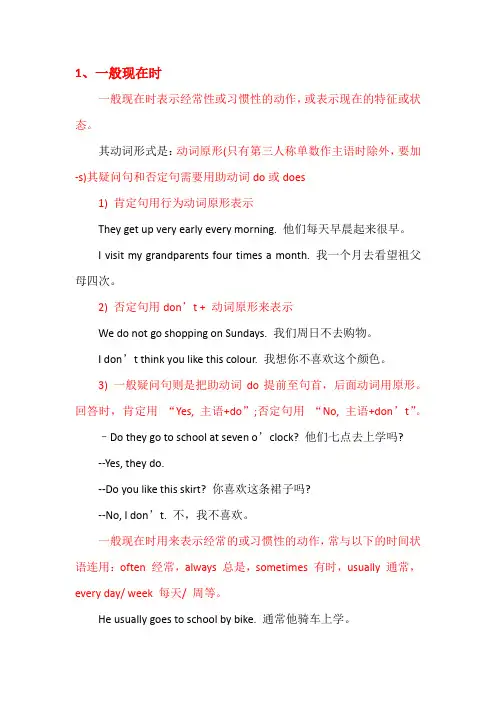
1、一般现在时一般现在时表示经常性或习惯性的动作,或表示现在的特征或状态。
其动词形式是:动词原形(只有第三人称单数作主语时除外,要加-s)其疑问句和否定句需要用助动词do或does1) 肯定句用行为动词原形表示They get up very early every morning. 他们每天早晨起来很早。
I visit my grandparents four times a month. 我一个月去看望祖父母四次。
2) 否定句用don’t + 动词原形来表示We do not go shopping on Sundays. 我们周日不去购物。
I don’t think you like this colour. 我想你不喜欢这个颜色。
3) 一般疑问句则是把助动词do提前至句首,后面动词用原形。
回答时,肯定用“Yes, 主语+do”;否定句用“No, 主语+don’t”。
–Do they go to school at seven o’clock? 他们七点去上学吗?--Yes, they do.--Do you like this skirt? 你喜欢这条裙子吗?--No, I don’t. 不,我不喜欢。
一般现在时用来表示经常的或习惯性的动作,常与以下的时间状语连用:often 经常,always 总是,sometimes 有时,usually 通常,every day/ week 每天/ 周等。
He usually goes to school by bike. 通常他骑车上学。
I visit my grandparents every week. 我每个星期都去看祖父母。
She is always late for class. 她总是上课迟到。
My parents and I sometimes go out to eat. 我和父母有时出去吃饭。
It often rains here. 这儿常常下雨。
人教版初中英语七年级上册语法知识点
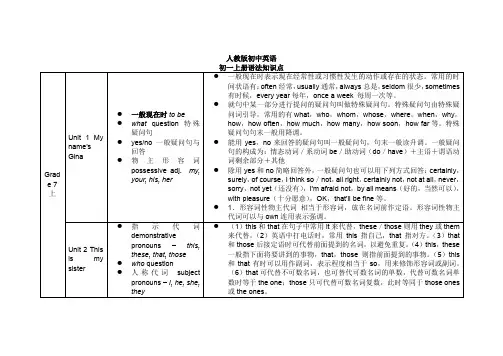
have表示“有”时,其否定形式有两种:在其后直接加not,但常用于非正式用语中;利用助动词do加not。
②如果句子的谓语是实义动词,在谓语动词前加don't,doesn't,didn't。
③no,never,seldom,hardly,nobody,little,few,nothing等否定词也可以构成否定形式。
1.表示经常性或习惯性发生的动作2.表示现在存在的状态或情况3.表示正在发生的动作或存在的状态4.表示客观事实、真理和自然现象5.用于表示较固定的、按计划、规定将要发生的动作,但只限于begin,come,go,leave,arrive,stop,return,close,open,take,start,take,place等少数动作,6.用于if,unless,once,even if(即使)等引导的条件状语从句,when,before,until,as soon as,the moment(一……就)等引导的时间状语从句,no matter+wh-/-how-或wh-ever/however等引导的让步状语从句中,代替一般将来时
人教版初中英语
初一上册语法知识点
Grade 7
上
Unit 1 My name’s Gina
初一英语知识点总结
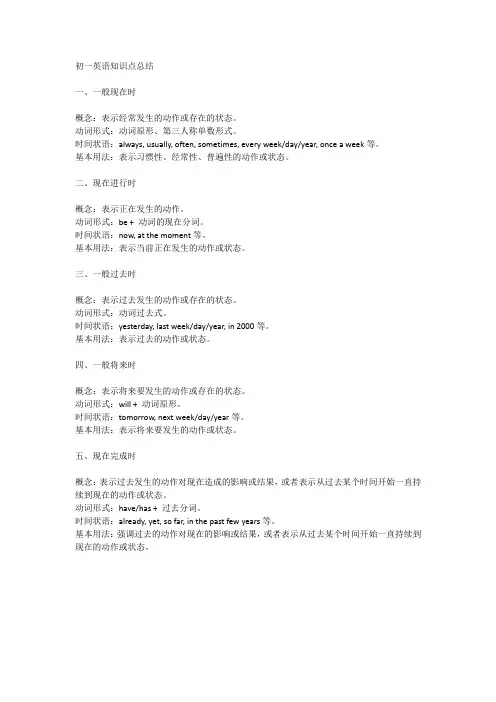
初一英语知识点总结
一、一般现在时
概念:表示经常发生的动作或存在的状态。
动词形式:动词原形、第三人称单数形式。
时间状语:always, usually, often, sometimes, every week/day/year, once a week等。
基本用法:表示习惯性、经常性、普遍性的动作或状态。
二、现在进行时
概念:表示正在发生的动作。
动词形式:be + 动词的现在分词。
时间状语:now, at the moment等。
基本用法:表示当前正在发生的动作或状态。
三、一般过去时
概念:表示过去发生的动作或存在的状态。
动词形式:动词过去式。
时间状语:yesterday, last week/day/year, in 2000等。
基本用法:表示过去的动作或状态。
四、一般将来时
概念:表示将来要发生的动作或存在的状态。
动词形式:will + 动词原形。
时间状语:tomorrow, next week/day/year等。
基本用法:表示将来要发生的动作或状态。
五、现在完成时
概念:表示过去发生的动作对现在造成的影响或结果,或者表示从过去某个时间开始一直持续到现在的动作或状态。
动词形式:have/has + 过去分词。
时间状语:already, yet, so far, in the past few years等。
基本用法:强调过去的动作对现在的影响或结果,或者表示从过去某个时间开始一直持续到现在的动作或状态。
一般现在时七年级知识点
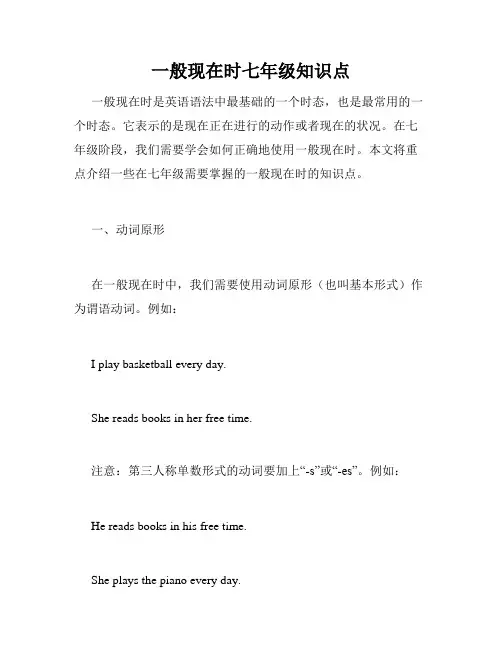
一般现在时七年级知识点一般现在时是英语语法中最基础的一个时态,也是最常用的一个时态。
它表示的是现在正在进行的动作或者现在的状况。
在七年级阶段,我们需要学会如何正确地使用一般现在时。
本文将重点介绍一些在七年级需要掌握的一般现在时的知识点。
一、动词原形在一般现在时中,我们需要使用动词原形(也叫基本形式)作为谓语动词。
例如:I play basketball every day.She reads books in her free time.注意:第三人称单数形式的动词要加上“-s”或“-es”。
例如:He reads books in his free time.She plays the piano every day.二、第三人称单数形式第三人称单数形式指的是以“-s”或“-es”结尾的动词形式,是在句子中表示第三人称单数主语时使用的动词形式。
例如:He likes to play soccer.She teaches English at the school.注意:有些动词的第三人称单数形式并不是以“-s”或“-es”结尾,例如“have”、“do”等。
这些动词在第三人称单数时不需要变化。
三、句型在一般现在时中,我们需要掌握以下两种基本的句型。
1. 主语+动词原形例如:I play basketball every day.They sing songs in the classroom.2. 主语+助动词“do/does”+动词原形例如:Do you like to eat pizza?Does she go to school by bus?注意:在第三人称单数形式的句子中,需要使用助动词“does”,例如:Does he like to play soccer?Does she play the piano every day?四、时间状语在一般现在时中,我们通常会加上时间状语来表明动作发生的时间或者频率。
人教版七年级英语上册语法专项_一般现在时
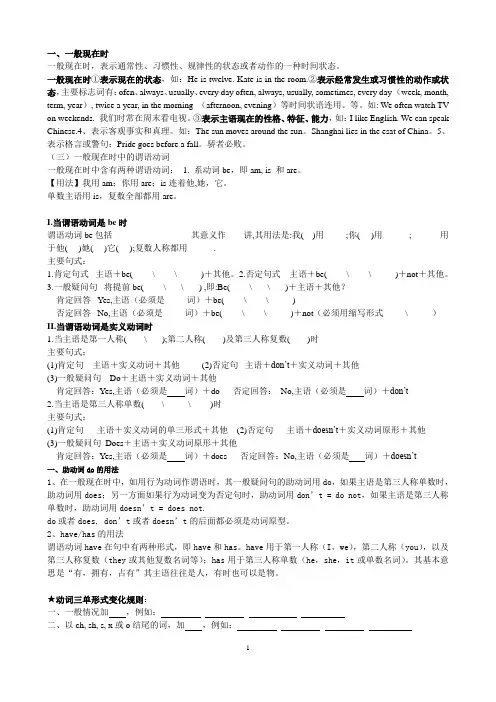
一、一般现在时一般现在时,表示通常性、习惯性、规律性的状态或者动作的一种时间状态。
一般现在时①表示现在的状态,如:He is twelve. Kate is in the room.②表示经常发生或习惯性的动作或状态,主要标志词有:ofen、always、usually、every day often, always, usually, sometimes, every day (week, month, term, year), twice a year, in the morning (afternoon, evening)等时间状语连用。
等。
如: We often watch TV on weekends. 我们时常在周末看电视。
③表示主语现在的性格、特征、能力,如:I like English. We can speak Chinese.4、表示客观事实和真理。
如:The sun moves around the sun。
Shanghai lies in the esat of China。
5、表示格言或警句:Pride goes before a fall。
骄者必败。
(三)一般现在时中的谓语动词一般现在时中含有两种谓语动词: 1. 系动词be,即am, is 和are。
【用法】我用am;你用are;is连着他,她,它。
单数主语用is,复数全部都用are。
I.当谓语动词是be时谓语动词be包括____ _____ _____ 其意义作____讲,其用法是:我( )用_____;你( )用______; ______用于他( )她( )它( );复数人称都用______.主要句式:1.肯定句式主语+be( ____\ ____\ _____)+其他。
2.否定句式主语+be( ____\ ____\ _____)+not+其他。
3.一般疑问句将提前be( ____\ ___\ ___) ,即:Be( ____\ ___\ ___)+主语+其他?肯定回答Yes,主语(必须是_____词)+be( ____\ ____\ _____)否定回答No,主语(必须是_____词)+be( ____\ ____\ _____)+not(必须用缩写形式____\ _____)II.当谓语动词是实义动词时1.当主语是第一人称(____\ ___);第二人称(____)及第三人称复数(____)时主要句式:(1)肯定句主语+实义动词+其他(2)否定句主语+don’t+实义动词+其他(3)一般疑问句Do+主语+实义动词+其他肯定回答:Yes,主语(必须是词)+do 否定回答:No,主语(必须是词)+don’t2.当主语是第三人称单数(____\ _____\ ____)时主要句式:(1)肯定句主语+实义动词的单三形式+其他(2)否定句主语+doesn’t+实义动词原形+其他(3)一般疑问句Does+主语+实义动词原形+其他肯定回答:Yes,主语(必须是词)+does 否定回答:No,主语(必须是词)+doesn’t一、助动词do的用法1、在一般现在时中,如用行为动词作谓语时,其一般疑问句的助动词用do,如果主语是第三人称单数时,助动词用does;另一方面如果行为动词变为否定句时,助动词用don’t = do not,如果主语是第三人称单数时,助动词用doesn’t = does not.do或者does, don’t或者doesn’t的后面都必须是动词原型。
人教版丨七年级上册英语语法专题复习(附练习题及答案)
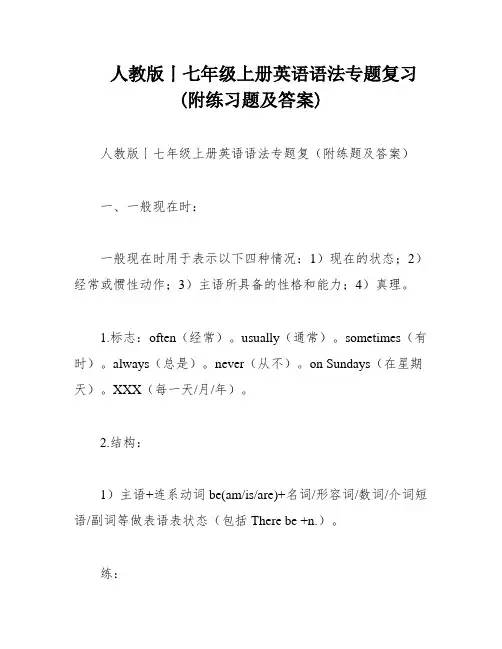
人教版丨七年级上册英语语法专题复习(附练习题及答案)人教版丨七年级上册英语语法专题复(附练题及答案)一、一般现在时:一般现在时用于表示以下四种情况:1)现在的状态;2)经常或惯性动作;3)主语所具备的性格和能力;4)真理。
1.标志:often(经常)。
usually(通常)。
sometimes(有时)。
always(总是)。
never(从不)。
on Sundays(在星期天)。
XXX(每一天/月/年)。
2.结构:1)主语+连系动词be(am/is/are)+名词/形容词/数词/介词短语/副词等做表语表状态(包括There be +n.)。
练:1.I am a student。
My name is Tom.2.Where are my shoes。
They are here.3.Who is the girl with long straight hair。
I think she is Kate.4.You and I are not in Class Six.5.XXX。
Yes。
there is.6.XXX。
No。
they aren't.2)主语(非第三人称单数)+行为动词原形+其他(用助动词do帮助构成否定句、一般疑问句和特殊疑问)。
3)主语(第三人称单数)+行为动词的第三人称单数+其他(用助动词does帮助构成否定句、一般疑问句和特殊疑问句)。
行为动词第三人称单数加-s的形式:1.-s2.辅音+y: study-studies3.以s,x,ch,sh结尾: watch-watches。
XXX4.特殊: have-has。
do-does。
go-goes。
练:1.His parents watch TV every night.肯定句:1.XXX.否定句:2.His parents do not watch TV every night.n: My brother does not do homework every day。
一般现在时与现在进行时人教版七年级英语下册
一般现在时与现在进行时到目前为止,我们已经学过了一般现在时和现在进行时这两种时态。
那么,它们之间有什么区别呢?仔细观察下面的例句,然后补全结论部分所缺的内容。
【例句】1. 一般现在时:I am happy. / She is a student. / They are free.Lily often / always / usually / sometimes / never walks to school.The boys play basketball every day / on Sundays / once a week.2. 现在进行时:I am reading newspapers now.Mr. Wang is writing a book these days / all the morning.Look! The children are dancing in the room.【结论】通过观察上面的例句,我们可以发现:1. 表示经常性、习惯性的动作或表示主语现在的身份、特征或状态等用____________(一般现在时 / 现在进行时);而表示说话时正在发生或进行的动作用____________(一般现在时 / 现在进行时)。
2. 一般现在时和现在进行时的谓语结构不同。
一般现在时的谓语结构通常为:be 动词(am / is / are),行为动词原形或第三人称单数形式;而现在进行时的谓语结构为:be动词 (am / is / are) +____________形式。
3. ____________(一般现在时 / 现在进行时)常与always, usually, often, sometimes, never, every day, on Sundays以及表示频率的词语等连用;____________(一般现在时 / 现在进行时)常与now, right now, these days, all the morning等时间状语连用,同时,Look! 和Listen! 也是这一时态的明显标志。
初一英语语法句子总结归纳人教版下册
初一英语语法句子总结归纳人教版下册初一英语语法句子总结归纳(人教版下册)一、一般现在时1. 主语 + 动词原形- I like playing basketball.我喜欢打篮球。
- She sings well.她唱得好。
2. 主语 + 动词原形 + 其他- They often go to the park on weekends.他们经常在周末去公园。
- My father usually cooks dinner for us.我爸爸通常为我们做晚餐。
3. 主语 + be动词(am, is, are) + 形容词- We are happy today.我们今天很开心。
- She is friendly to everyone.她对每个人都很友好。
4. 主语 + be动词(am, is, are) + 名词- I am a student.我是一名学生。
- They are doctors.他们是医生。
5. 主语 + be动词(am, is, are) + 动词ing- He is playing football in the park.他正在公园里踢足球。
- We are watching a movie at home.我们正在家里看电影。
二、一般过去时1. 主语 + 动词过去式- I listened to music yesterday.昨天我听音乐。
- She played chess with her friends last night.昨晚她和朋友下棋。
2. 主语 + be动词(was, were) + 形容词- He was tired after school.放学后他感到累。
- They were happy at the party.派对上他们很快乐。
3. 主语 + be动词(was, were) + 名词- I was a student two years ago.两年前我是一名学生。
(完整word版)人教版英语初一语法一般现在时
九三管理局局直中学初一英语Unit 1一、语法——一般现在时。
一)一般现在时的用法:1.表示习惯性的、现在反复出现的动作或状态:I usually go to school at 7:00. 我通常七点上学。
2. 表示主语现在的状态和特征:She often helps me.3. 表示客观事实或普遍真理:The earth goes around the sun. 地球绕着太阳转。
二)句子结构:1. 当谓语动词是实义动词,句子结构:主语+ 动词原形/ 动词单三1) 当主语不是第三人称单数,谓语动词是实义动词,肯定句:主语+ 动词原形I go to school at 8:00.否定句:主语+ don’t+ 动词原形I don’t go to school at 8:00.一般疑问句:Do + 主语+ 动词原形Do you go to school at 8:00?肯定回答:Yes, 主语+ do. Yes, I do.否定回答:No,主语+ don’t. No, I don’t.2) 当主语是第三人称单数,谓语是实义动词,肯定句:主语+ 动词单三She goes to school at 8:00.否定句:主语+ doesn’t + 动词原形She doesn’t go to school at 8:00.一般疑问句:Does + 主语+ 动词原形Does she go to school at 8:00 ?肯定回答:Yes, 主语+ does.Yes, she does.否定回答:No,主语+ doesn’tNo, she doesn’t.3)动词第三人称单数的变化规则:a. 一般情况下,在词尾加-s:play- plays get- gets.b. 以s,x,sh,ch结尾的动词,在词尾加-es:watch- watches go- goes.c. 以辅音字母加y结尾的动词,要把y变成i,再加-es:fly- flies study- studies2. 当谓语动词是be动词,句子结构:主语+ be 的适当形式1) 肯定句:主语+ be (am / is are)I am an English teacher.否定句:主语+ be (m / is are)+ notI am not an English teacher.一般疑问句:Be(Is/ Are) + 主语Are you an English teacher?肯定回答:Yes, 主语+ be(am/ is/ are). Yes, I am.否定回答:No,主语+ don’t. No, I am not.2)be动词的使用口诀:我用am,你用are,is连着他她塔,单数is 复数are。
初中一般现在时讲解
初中一般现在时讲解初中一般现在时是英语中最基础的时态之一,也是我们在日常生活中最常使用的时态之一。
通过初中一般现在时的运用,我们可以描述当前的状况、习惯、经常发生的动作和普遍真理等。
在本文中,我们将重点讲解初中一般现在时的使用规则和一些注意事项。
一、基本的初中一般现在时结构初中一般现在时的基本结构为:主语 + 动词原形(第三人称单数要加-s)+ 其他成分。
例如:- I play soccer after school.(我放学后踢足球。
)- He watches TV every evening.(他每天晚上看电视。
)- They eat lunch at 12 o'clock.(他们在12点吃午饭。
)二、陈述句的变化规则1. 第三人称单数形式在初中一般现在时中,第三人称单数(he、she、it或名词单数)的动词要变为原形加上-s。
例如:- She sings very well.(她唱得很好。
)- He plays basketball with his friends.(他和他的朋友们一起打篮球。
)- The dog barks loudly at strangers.(这条狗对陌生人叫得很大声。
)2. 不可数名词和复数名词与不可数名词一起使用时,动词保持原形。
与复数名词一起使用时,动词也保持原形。
例如:- The water tastes good.(水的味道很好。
)- The boys play soccer every Saturday.(这些男孩每个星期六踢足球。
)3. 特殊的第三人称单数形式以s、x、ch、sh和o结尾的名词通常在第三人称单数形式中加-es。
例如:- The bus goes to the city center.(这辆公交车开往市中心。
)- A box of candies is on the table.(桌子上有一盒糖果。
)- She brushes her teeth after meals.(她餐后刷牙。
- 1、下载文档前请自行甄别文档内容的完整性,平台不提供额外的编辑、内容补充、找答案等附加服务。
- 2、"仅部分预览"的文档,不可在线预览部分如存在完整性等问题,可反馈申请退款(可完整预览的文档不适用该条件!)。
- 3、如文档侵犯您的权益,请联系客服反馈,我们会尽快为您处理(人工客服工作时间:9:00-18:30)。
九三管理局局直中学初一英语Unit 1一、语法——一般现在时。
一)一般现在时的用法:1.表示习惯性的、现在反复出现的动作或状态:I usually go to school at 7:00. 我通常七点上学。
2. 表示主语现在的状态和特征:She often helps me.3. 表示客观事实或普遍真理:The earth goes around the sun. 地球绕着太阳转。
二)句子结构:1. 当谓语动词是实义动词,句子结构:主语+ 动词原形/ 动词单三1) 当主语不是第三人称单数,谓语动词是实义动词,肯定句:主语+ 动词原形I go to school at 8:00.否定句:主语+ don’t+ 动词原形I don’t go to school at 8:00.一般疑问句:Do + 主语+ 动词原形Do you go to school at 8:00?肯定回答:Yes, 主语+ do. Yes, I do.否定回答:No,主语+ don’t. No, I don’t.2) 当主语是第三人称单数,谓语是实义动词,肯定句:主语+ 动词单三She goes to school at 8:00.否定句:主语+ doesn’t + 动词原形She doesn’t go to school at 8:00.一般疑问句:Does + 主语+ 动词原形Does she go to school at 8:00 ?肯定回答:Yes, 主语+ does.Yes, she does.否定回答:No,主语+ doesn’tNo, she doesn’t.3)动词第三人称单数的变化规则:a. 一般情况下,在词尾加-s:play- plays get- gets.b. 以s,x,sh,ch结尾的动词,在词尾加-es:watch- watches go- goes.c. 以辅音字母加y结尾的动词,要把y变成i,再加-es:fly- flies study- studies2. 当谓语动词是be动词,句子结构:主语+ be 的适当形式1) 肯定句:主语+ be (am / is are)I am an English teacher.否定句:主语+ be (m / is are)+ notI am not an English teacher.一般疑问句:Be(Is/ Are) + 主语Are you an English teacher?肯定回答:Yes, 主语+ be(am/ is/ are). Yes, I am.否定回答:No,主语+ don’t. No, I am not.2)be动词的使用口诀:我用am,你用are,is连着他她塔,单数is 复数are。
二、习题。
一)用be动词的适当形式填空。
1. I ____ a student. You ____ a teacher.2. She _____ my friend.3. ____ you Li Fen ? No, ____ not .4. ____ Mr. green very busy? Yes, he ____.5. You and I____ good friends .6. The girl in red clothes_____ my sister .二)将下列句子变成一般疑问句,并给出肯定及否定回答。
1. Simon and Daniel like going skating.2. My parents watch TV every day.3. Sun Yang and Sun Fang usually wash clothes on Saturdays.4. Her classmates play football in school.5. Gao Shan's sister likes playing table tennis.6. My dog runs fast.7. Mingming usually waters the flowers every day.8. Tom does his homework at home.三)改错。
1. I goes to school at six every day.2. He don’t like playing football.3. They likes playing games.4. Daming watchs TV in the evening.5. Does he usually has a party?6. What do they on Sunday?7. Tony goes always to school at eighto’clock.8. What they eat in the party?9. Lily haves lunch at school.10. What do his parents usually gives him ?四)句型转换。
1. I want to buy a big green bag . (变特殊疑问句)______ ____ you want to buy?2. Mary does not have any books . (变肯定句)Mary _____ ______ books .3. She likes the black bag. (变为否定句)4. I buy the pants for only 50 Yuan. (用she改写句子)______ ______ the pants for only 50 Yuan.5. He often has hamburgers and apples for dinner . (变为一般疑问句) 6.This is my pencil ? (变一般疑问句) ______ ______ your pencil ?7. These red socks are Kate's . (变一般疑问句)______ _____ red socks Kate's ?8. I want to buy a big green bag . (就划线部分提问)_____ _____ you want to buy ?9. Mary does not have any books . (变肯定句)Mary _____ ______ books .10. The clothing shop is on sale . (变为否定句)11. She likes the black bag very much . (变为否定句)12. I buy the pants for only 50 Yuan. (用she改写句子)She ____ the pants for only 50 Yuan.五)用所给动词的适当形式填空。
1. We often________(play) on the playground.2. He _________(get) up at six o'clock.3. __________you _________(brush) your teeth every morning.4. What____ (do) he usually _____(do) after school?5. Danny _______(study) English, Chinese, maths, Science and Art at school.6. Mike sometimes __________(go) to the park with his sister.7. At eight at night, she ________(watch) TV with his parents.8. ________ Mike________(read) English every day?9. How many lessons ______your classmate____(have) on Monday?10. What time ____his mother_________(do) the housework?11. He often ______(have) dinner at home. 12. Daniel and Tommy___ (be) in ClassOne.12. People usually______ (eat) dinner in the evening .13. His sister usually_____(go) to school at 7:00 am .14. Lin Tao_____ (like) his new sweater .15. Let me _____(have) a look .16. ____ he_____(like) English ?17. I want_____ (go) to a movie .18. He ____________ (not know)the teacher's name .19. Can I _____ (ask) the policeman ?21. She likes______(play) chess .22. The teacher teaches ______(listen).。
